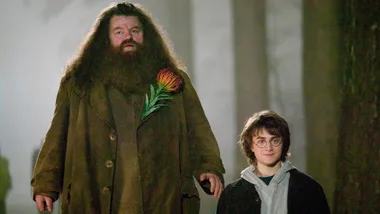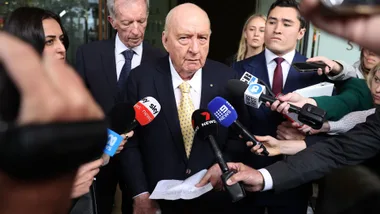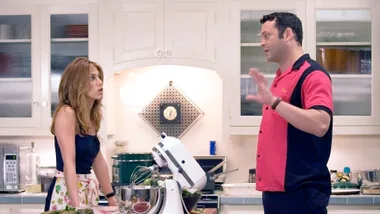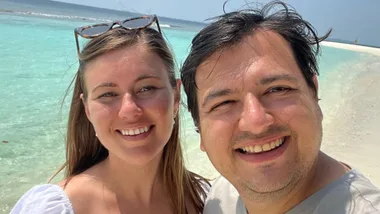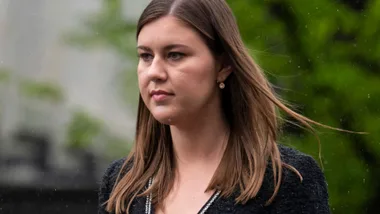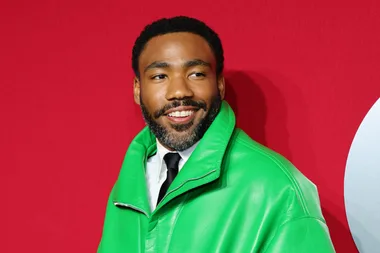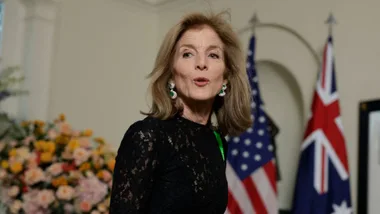Fiona O’Loughlin is Australian comedy royalty. But for years, she was caught in a toxic trap, using alcoholism as material for her stand-up and using comedy as an excuse for her addiction.
For the first time, she reveals the true depths and darkness of her disease in this exclusive extract of her new book Truths from an Unreliable Witness…
I didn’t follow the protocol that night. Since coming out as an alcoholic in 2009 when I collapsed on a Brisbane stage in front of 400 paying ticketholders after drinking a stupid amount of vodka, I had put in place measures to protect myself from temptation at gigs: my team would remove the mini-bar from my hotel room and organise a driver to pick me up from the event straight after I walked off stage.
That night in 2012, I emceed a corporate gig for a disability charity at Parliament House in Canberra. It had gone phenomenally well, and the organiser was thanking me profusely as I walked off stage. He was a gay man about my age who was dying of cancer; this was to be his last event.
I was invested in making sure it was a great night for him, so when he told me a respected judge wanted to meet me, I agreed to go. I told my driver to leave, and said that I’d catch a taxi back to the hotel. That was my first mistake. And I made it willingly, knowing that I was immediately opening myself up to temptation.
On my way to the bathroom to fix my makeup before shaking the esteemed judge’s hand, I passed an unaccompanied catering trolley full of champagne flutes, filled to the brim with bubbles of temptation.
Temptation I couldn’t resist. I downed three glasses on my way into the toilet, and three on the way out. That was my second mistake, and third and fourth and fifth and …
Part of me was flattered that a judge wanted to meet me, Fiona O’Loughlin from Warooka in South Australia. Imagine that. Another part of me, the inner alcoholic, was always looking for a reason to relapse – and free unattended champagne proved to be an impossible test.
I told myself I was doing it for the organiser who was dying of cancer. By staying at the event and meeting the judge, I was basically fulfilling the bloke’s last dying wish. Who was I to deny him that?
After six champagne flutes, I was hilariously witty and charming with the judge. The organiser couldn’t have been happier with me. I’d gone above and beyond to make his final event a roaring success. It was another reason to stay and enjoy the night, another excuse to drink on the sly, another excuse to lie to myself.
When the event wrapped up, a group of women were going to kick on in the wild city of Canberra and invited me to join them. “Oh no, I can’t. I don’t drink,” I said, already flying.
The group insisted. “Oh, Jeanene’s our sober driver for the night, she’ll drink orange juice with you.”
My last memory is of sitting in the outdoor area of a city establishment, slipping the waiter $20 and $50 notes to put vodka in my orange juice. From there, it’s only vague flashes.
Waving goodbye to the women when they call it a night at a decent hour. Flash. Sitting in the gutter outside a club with a young couple smoking cigarettes and talking shit, sharing my slurred life wisdom. Flash. Going to an ATM and withdrawing cash, too much cash. Flash.
I don’t remember how I got back to my hotel or unlocking the door to my soulless room with grey carpet and charred black timber finishes. My next flash of memory is waking up in my hotel room in the dark early hours of the morning. There’s someone on top of me and inside me.
I don’t know if my underpants are on the carpet discarded by the side of the bed or scrunched up between the sheets. I know I didn’t take them off. I pass back out in the darkness; dark sky, dark timber, dark memories.
In the light of the morning, I wake with a sense of dread and a foul taste in my mouth. The memory of what happened in the darkness comes rushing back to me.
When I see the stranger next to me in bed, it’s like a bolt of realisation. I know I have altered my life forever. Nothing will ever be the same. What has happened can never be undone.
It’s only after I’ve contemplated the enormity of the situation that I think about my safety. I don’t know who this person is, what he’s capable of or how he’ll act when he wakes up. My internal safety debriefing is interrupted by the blaring noise of the phone ringing on the bedside table. I’ve missed my flight heading to Adelaide where I was to meet my husband, Chris, and host the Pink Ribbon Ball.
“No, I’m not drinking,” I tell Chris, lying through my furry teeth. “Of course I’m not drinking, I just slept in.”
By now, the stranger is sitting up in bed. I consider my options and decide the safest bet is to act completely normal and gauge if he is a serial killer or a regular bloke thinking he’s had a one-night stand. I start talking to him and bitching about my husband for waking us up. I know I have to get the stranger out of the room, and I think the easiest way to do that is to act like he is supposed to be there.
What I didn’t know was that I hadn’t hung up the phone properly, and Chris was listening to every word I spoke to the stranger in my bed. After making small talk, I realise I’m not in mortal danger. He’s not particularly threatening, so I forcefully ask him to leave.
I must have given the stranger my number because later on that dreadful day, my phone buzzes with a blatant text: I’m not a bad man.
I’ve never called it rape. Sometimes words are safer left unspoken. Even though there’s no way I could have consented to having sex because I was passed out, I’m not a reliable witness to what happened that night. I have no memory of how the stranger ended up in my hotel room, in my bed, inside me. For all I know, he could have been a raging alcoholic himself, on a bender, not in control of his actions.
I’ve never thought of myself as a rape victim. When it happened, I figured I had enough to be sad about already. There was no room in my heart to afford myself any comfort. I was the one who put myself in that situation. I was the one who relapsed. I was the one who got blackout drunk and opened the door to danger. I may not have deserved what happened, but I didn’t deserve any tears of sympathy either.
After I got the stranger out the door, Chris rang me back and told me he’d heard everything. I spiralled – and kept drinking – while my manager organised a new flight for me. I stayed awake for nights afterwards. My pupils like saucers.
When I arrived in Adelaide a couple of days later and checked into our hotel suite, Chris couldn’t speak to me or look at me. He was convinced I was having a full-blown affair with this bloke in Canberra. Someone had told him, “You must never forgive her.” And he didn’t. Every time I tried to talk to him about what had happened, he shut me down and refused to listen.
I was utterly shattered. I’d mounted up so many intolerable memories, I didn’t have space for any more. I wanted to black out and stay blacked out. There was only one option: I just had to get through the Pink Ribbon Ball and then I could kill myself.
I performed completely shit-faced and woke up alone next morning. Chris had left early to play golf. In the suite, I had access to insurmountable amounts of alcohol and I knew what I had to do. I was going to get impossibly drunk and drown myself in the bathtub. I drew a bath and drank as much as I could, in the hope I would pass out, sink under the water and die.
I felt like I had made a mess so big I couldn’t clean it up, ever. I was desperate to end it; so desperate, the thought of Chris finding my body didn’t enter my mind. Nor did the idea of my kids attending my funeral. I chugged Grey Goose from the bottle and willed myself to slip under the water. I did pass out a number of times, but I kept waking up in a cold bath with my head above water. For fuck’s sake.
I refilled the tub with warm water again and again. Then I forced myself under the rim and held my breath, only to involuntarily surface for air.
Drowning yourself is the hardest thing to do. Every time I came up for air, I hated myself. How pathetic, weak, useless could one person be? I was nothing, less than nothing.
When it became apparent I wasn’t going to be able to end the misery in the bathtub, I called my sister Cate and said, “I’ve been trying to kill myself all day. Can you help me?”
I was admitted to The Adelaide Clinic. It was my first time in a psychiatric ward, and it was pure bliss. I was safe. I was there for a month, being looked after, eating properly and not drinking alcohol.
I didn’t see or hear from Chris while I was at the clinic. When I was discharged, I found out that life back home in Alice Springs would never be the same again. Chris had told the kids. He’d told everybody. It seemed as if the whole town knew. I didn’t try to defend myself. I was too ashamed. I explained to the kids what I remembered and didn’t bring it up again.
Years later I was talking to my youngest daughter, Mary-Agnes, about sexual assault and told her I was still confused about what had happened in Canberra. In my mind, it was as grey as the hotel room carpet.
When I stepped through the door to our family home after a month in the clinic, I was a stranger. I slept on a mattress on the living room floor. It was a heinous time and I can’t remember exactly how long it lasted. I begged, I pleaded. I cooked, I cleaned. I tried to act like everything was normal, but it wasn’t. Nothing would ever be the same again.
After 27 years of marriage and five children, Chris and I separated later that year and I moved to Melbourne. We’re still not legally divorced, even though we’ve been apart for eight years. I wouldn’t even know where to begin with getting a divorce. And I think a part of me still can’t imagine not being married to him.
There are many things I regret in my life – hurting my family, destroying my marriage, putting myself in danger and harming my career – but you can never regret anything that led to your children.
I know deep in my soul that Chris and I were meant to have those kids together. I can’t erase my mistakes, and even if I could, I don’t know if I would.
After a year of sobriety and the life-affirming experience of writing my memoir, I know now my fuck-ups are a part of me and a part of my story. And let me tell you, it’s a hell of a story.
Truths from an Unreliable Witness by Fiona O’Loughlin with Alley Pascoe (Hachette, $32.99) is out now.
For help, call Lifeline on 13 11 14 or Beyond Blue on 1300 22 4636

